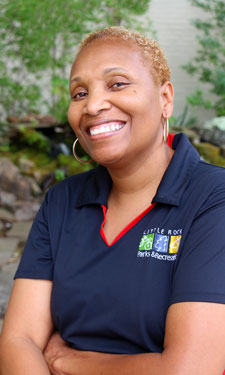 Selandria Jackson wasn’t expecting to end up in the park and recreation field, but, like many of her peers, the Little Rock native succumbed to its siren call while already working on a master’s degree in social work. “In graduate school in Atlanta, while working on my master’s [degree], I was offered a job at the city of Atlanta Department of Parks and Recreation,” she explains. “And so, here I am, going to school thinking one way (planning to do something in social work), but I’m over here working in parks and rec thinking, ‘This is cool!’ I keep going to school, keep working, but I thought to myself, “Figure out what you want to do,” and parks and recreation won. After I graduated, I get back to Little Rock and the parks and recreation department here says, ‘Hey, come on up here!’ So, I did…and I’m still here! Almost 20 years later!” As recreation supervisor for Little Rock Parks and Recreation (LRPR) — a title she’s held since 2010 — Jackson has made a significant impact at her agency, including working to implement health initiatives and developing grant proposals to increase her agency’s reach in the community. We asked Jackson to tell us more about her work — below are her insights.
Selandria Jackson wasn’t expecting to end up in the park and recreation field, but, like many of her peers, the Little Rock native succumbed to its siren call while already working on a master’s degree in social work. “In graduate school in Atlanta, while working on my master’s [degree], I was offered a job at the city of Atlanta Department of Parks and Recreation,” she explains. “And so, here I am, going to school thinking one way (planning to do something in social work), but I’m over here working in parks and rec thinking, ‘This is cool!’ I keep going to school, keep working, but I thought to myself, “Figure out what you want to do,” and parks and recreation won. After I graduated, I get back to Little Rock and the parks and recreation department here says, ‘Hey, come on up here!’ So, I did…and I’m still here! Almost 20 years later!” As recreation supervisor for Little Rock Parks and Recreation (LRPR) — a title she’s held since 2010 — Jackson has made a significant impact at her agency, including working to implement health initiatives and developing grant proposals to increase her agency’s reach in the community. We asked Jackson to tell us more about her work — below are her insights.
Parks & Recreation magazine:You’ve been active in LRPR’s Commit to Health initiatives — why is programming and education that focuses on the physical and mental well-being of communities important to you and the people you serve?
Selandria Jackson: When I started looking at statistics on Arkansas and found out it’s one of the leading states in childhood obesity, that got my attention. I thought, ‘What could we do?’ [LRPR was] already doing athletics — I did research and found out about the healthy eating component we could offer through the afterschool meals. LRPR partnered with another local agency and started offering healthy meals and snacks. Our parents were so excited for healthy meals for their children, too! The kids eat lunch early at school — as early as 10 a.m. — so when we get them at 3 p.m. they are HUNGRY! Offering a healthy meal really helped out!
P&R: You’ve also been instrumental in the implementation of a 2015 NRPA out-of-school-time feeding program grant — what impact has this had on LRPR’s ability to feed more people?
Jackson: We purchased food warmers and grills, and I was able to get our Therapeutic Recreation Center a grill. Now, they’re able to have their events and parties and grill! With the warmers, the foods can stay at the right temperatures. We were also able to expand the feeding program and offer more meals to others in the community. Now, more people get to take advantage of our meal program!
P&R: Your educational background is in social work — how does that training inform and support your work as a recreation supervisor?
Jackson: I think my degree is very important to what I do because I am able to relate to people very well. I see, on a personal level, what’s really going on when staff members bring something to me. Issues that might be deeper than just “coming to work.”
P&R: What’s one of the greatest challenges in your role as LRPR recreation supervisor?
Jackson: Funding. Funding for programs limits us. Budgeting is No. 1.
P&R: What is one of your greatest professional successes?
Jackson: I think one of my accomplishments I’m proud of is getting these grants! In the last two or three years, I was able to help secure more than $200,000 worth of grant money for our department.
— Samantha Bartram, Executive Director of Parks & Recreation magazine

